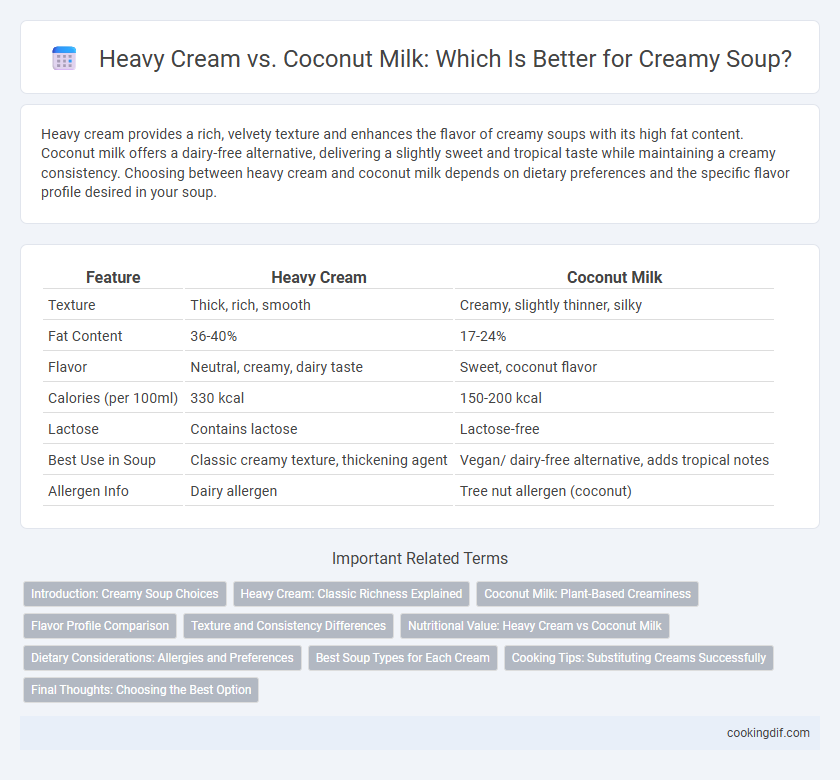Heavy cream provides a rich, velvety texture and enhances the flavor of creamy soups with its high fat content. Coconut milk offers a dairy-free alternative, delivering a slightly sweet and tropical taste while maintaining a creamy consistency. Choosing between heavy cream and coconut milk depends on dietary preferences and the specific flavor profile desired in your soup.
Table of Comparison
| Feature | Heavy Cream | Coconut Milk |
|---|---|---|
| Texture | Thick, rich, smooth | Creamy, slightly thinner, silky |
| Fat Content | 36-40% | 17-24% |
| Flavor | Neutral, creamy, dairy taste | Sweet, coconut flavor |
| Calories (per 100ml) | 330 kcal | 150-200 kcal |
| Lactose | Contains lactose | Lactose-free |
| Best Use in Soup | Classic creamy texture, thickening agent | Vegan/ dairy-free alternative, adds tropical notes |
| Allergen Info | Dairy allergen | Tree nut allergen (coconut) |
Introduction: Creamy Soup Choices
Heavy cream provides a rich, velvety texture and a classic dairy flavor ideal for traditional creamy soups like chowders and bisques. Coconut milk offers a dairy-free alternative with a subtle sweetness and tropical aroma, perfect for vegan or Asian-inspired soups. Choosing between heavy cream and coconut milk depends on dietary preferences, desired flavor profiles, and the soup's cultural context.
Heavy Cream: Classic Richness Explained
Heavy cream provides a classic richness to creamy soups with its high fat content, typically around 36-40%, which ensures a smooth, velvety texture and full-bodied flavor. Unlike coconut milk, heavy cream does not impart a distinct taste, making it ideal for traditional recipes like cream of mushroom or tomato bisque that rely on subtle, dairy-based creaminess. Its ability to withstand heat without curdling guarantees consistent thickness and a luxurious mouthfeel in various creamy soup preparations.
Coconut Milk: Plant-Based Creaminess
Coconut milk offers a rich, plant-based creaminess ideal for dairy-free soups, providing a smooth texture without the lactose found in heavy cream. High in healthy fats, coconut milk enhances flavor complexity while adding a subtle sweetness that complements savory ingredients. Its natural emulsifying properties create a velvety finish, making it a popular choice for vegan and allergen-friendly creamy soups.
Flavor Profile Comparison
Heavy cream offers a rich, velvety texture with a sweet, buttery flavor that enhances the depth of creamy soups. Coconut milk provides a dairy-free alternative featuring a subtle sweetness and tropical, nutty undertones that impart an exotic twist to the dish. Choosing between heavy cream and coconut milk depends on desired flavor complexity and dietary preferences in creamy soup recipes.
Texture and Consistency Differences
Heavy cream provides a rich, velvety texture and thick consistency that enhances the creaminess of soups, making them smooth and indulgent. Coconut milk offers a slightly lighter yet still creamy texture, with a thinner consistency and subtle sweetness that can add a tropical flavor dimension. The choice between heavy cream and coconut milk depends on the desired mouthfeel and flavor profile, with heavy cream delivering a denser, more luxurious soup base.
Nutritional Value: Heavy Cream vs Coconut Milk
Heavy cream contains higher saturated fat and calories, with approximately 52 grams of fat and 414 calories per cup, contributing to a rich, creamy texture in soups. Coconut milk offers a plant-based alternative with about 57 grams of fat and 445 calories per cup, but its fat is mainly medium-chain triglycerides (MCTs), which may provide different health benefits. While heavy cream supplies calcium and vitamin A, coconut milk provides iron and manganese, making each option unique in nutritional value for creamy soup preparation.
Dietary Considerations: Allergies and Preferences
Heavy cream offers a rich, dairy-based option that may trigger lactose intolerance or dairy allergies, making it unsuitable for those with lactose sensitivity or milk protein allergies. Coconut milk provides a plant-based, dairy-free alternative rich in healthy fats, ideal for vegans and individuals with dairy restrictions, though it may not suit people with nut allergies due to cross-reactivity concerns. Choosing between heavy cream and coconut milk for creamy soup depends on dietary preferences, allergy considerations, and desired nutritional content.
Best Soup Types for Each Cream
Heavy cream enhances the richness and velvety texture of classic creamy soups like clam chowder, cream of mushroom, and broccoli cheddar, providing a decadent mouthfeel and deep flavor. Coconut milk is ideal for dairy-free and vegan-friendly soups such as Thai coconut curry, pumpkin bisque, and spicy lentil soup, offering a subtle sweetness and smooth creaminess without lactose. Both creams improve texture and flavor but cater to different dietary preferences and soup profiles.
Cooking Tips: Substituting Creams Successfully
Heavy cream provides a rich, velvety texture and enhances the flavor in creamy soups, while coconut milk offers a dairy-free alternative with a slightly sweet, nutty taste suitable for vegan recipes. To substitute heavy cream with coconut milk successfully, use full-fat coconut milk to maintain the soup's thickness and add a subtle coconut aroma without overpowering other flavors. When cooking, add coconut milk towards the end of simmering to prevent curdling and achieve a smooth, creamy consistency.
Final Thoughts: Choosing the Best Option
Heavy cream delivers a rich, velvety texture with a higher fat content, ideal for classic creamy soups requiring thickness and depth. Coconut milk offers a dairy-free alternative with a subtle sweetness and lower saturated fat, making it suitable for vegan or lactose-intolerant diets. Selecting between heavy cream and coconut milk depends on dietary preferences, desired flavor profiles, and the nutritional goals of the soup.
Heavy Cream vs Coconut Milk for creamy soup Infographic

 cookingdif.com
cookingdif.com